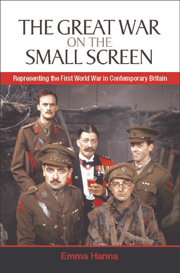Book contents
- Frontmatter
- Contents
- Acknowledgements
- List of abbreviations
- List of illustrations
- Introduction
- 1 An Unhealed Wound: Britain and the First World War
- 2 A Monumental Monument: The Great War (BBC, 1964)
- 3 Survivors: Veterans and the Nature of Personal Testimony
- 4 Heroes and Villains
- 5 Drama, Comedy and Drama Documentary
- 6 Over the Top: Reality Experiential Television
- 7 The Fear of Forgetting
- Filmography
- Bibliography
- Index
7 - The Fear of Forgetting
Published online by Cambridge University Press: 05 August 2013
- Frontmatter
- Contents
- Acknowledgements
- List of abbreviations
- List of illustrations
- Introduction
- 1 An Unhealed Wound: Britain and the First World War
- 2 A Monumental Monument: The Great War (BBC, 1964)
- 3 Survivors: Veterans and the Nature of Personal Testimony
- 4 Heroes and Villains
- 5 Drama, Comedy and Drama Documentary
- 6 Over the Top: Reality Experiential Television
- 7 The Fear of Forgetting
- Filmography
- Bibliography
- Index
Summary
As the age of modern television began in the 1950s and picked up speed in the 1960s, many military historians began to re-evaluate the alleged futility and wastefulness of the First World War. However, the powerful visual impetus of the developing medium utilised established modes of remembrance rooted in Britain's cultural heritance, which meant that televisual representations of the war continued to portray the conflict as the most tragic episode in British national life. These signifying practices were developed to enable the nation to mourn the death and disappearance of so many of its sons, and in the years after 1945, television documentaries about the conflict became the most public site of memory and mourning for remembering the First World War. Britain is afraid it will forget.
Since the 1960s, television quickly became a self-defining subject where the production and reactivation of history occurred on the screen. Television documentaries about the First World War developed not as objective assessments of past events but as media events, and the televisual histories of the First World War were built on Britain's rich cultural inheritance fashioned from established modes of remembrance. The act of producing, broadcasting and watching television programmes about the First World War became a remembrance ritual in its own right. Television documentaries about the First World War were adopted as alternative war memorials.
Information
- Type
- Chapter
- Information
- The Great War on the Small ScreenRepresenting the First World War in Contemporary Britain, pp. 163 - 172Publisher: Edinburgh University PressPrint publication year: 2009
